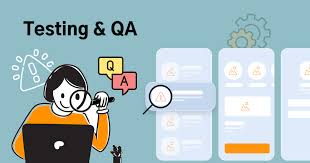In today’s digital-first world, creating a high-performing mobile or web app requires more than just great code—it demands rigorous testing. Whether you’re developing a banking app, e-commerce solution, or internal enterprise software, quality assurance ensures the final product is reliable, secure, and user-friendly.
If you’re working with an app development company based in Dallas, understanding their approach to software testing helps ensure you’re investing in a partner that prioritizes quality. In this blog, we’ll break down the most widely used testing methodologies, answer common questions, and explain how these methods impact the success of your app.
Why Is Testing Important in App Development?
Testing is crucial to identify bugs, usability issues, security vulnerabilities, and performance bottlenecks. It ensures that:
- The app performs well under various conditions
- Users don’t face unexpected crashes or glitches
- The product meets business goals and end-user expectations
- Time and money are saved by catching issues early
A software development company in Dallas that offers thorough testing as part of their software development services will always deliver better, more stable applications.
What Is Manual Testing?
Manual testing involves human testers executing test cases without the use of automation tools. It’s essential for:
- User Interface (UI) evaluations
- Usability testing
- Exploratory testing
- Compatibility across devices and browsers
Example Use Case:
A Dallas app development team might manually test a new fitness app’s UI on multiple iOS and Android devices to ensure consistent design and function.
What Is Automated Testing?
Automated testing uses tools like Selenium, Appium, or Cypress to automatically execute predefined test cases. It is ideal for:
- Regression testing
- Performance/load testing
- Repeated, high-volume testing
- Continuous integration and deployment (CI/CD)
Key Benefits:
- Faster execution compared to manual testing
- Consistency in results
- Early bug detection during development cycles
An app development company based in Dallas will often integrate automated testing in Agile pipelines to ensure rapid and reliable product releases.
What Is Functional Testing?
Functional testing checks if the application functions according to business requirements. It verifies:
- Inputs and outputs of each feature
- Correctness of business logic
- Workflow validations
Example Scenario:
If a Dallas-based food delivery app must allow users to reorder past meals, functional tests will confirm this works across different order histories.
How Does an App Development Company in Dallas Use Agile Testing?
Agile testing is integrated within the Agile software development process. Testing begins early and happens continuously, promoting collaboration among developers, testers, and product owners.
Common Agile Testing Practices:
- Test-Driven Development (TDD): Writing tests before writing the actual code
- Behavior-Driven Development (BDD): Focusing on expected app behavior
- Scrum Testing Sprints: Dedicated test activities in each sprint cycle
Agile testing allows an app development company based in Dallas to adjust quickly to customer feedback and deliver reliable software faster.
What Is Regression Testing?
Regression testing ensures that new code changes don’t break existing functionality. It is commonly automated to speed up checks after every update.
Key Benefit:
Prevents new bugs from being introduced during feature updates or refactoring.
Dallas development firms often use CI/CD pipelines with automated regression testing tools to ensure seamless app upgrades.
What Is Performance Testing?
Performance testing measures how the app performs under different conditions such as high traffic or limited bandwidth.
Types include:
- Load Testing: Evaluating how many users the app can handle
- Stress Testing: Measuring how the app performs under peak loads
- Scalability Testing: Ensuring the app can grow with demand
A professional software development company in Dallas will run these tests to prepare apps for real-world usage spikes.
What Is Security Testing?
Security testing identifies potential vulnerabilities and ensures that the app complies with data protection standards like GDPR or HIPAA.
Common Security Tests:
- Authentication & authorization testing
- Penetration testing
- Data encryption validation
- API security
When offering software development services, Dallas firms often include a security audit before launch—especially for fintech, healthcare, or e-commerce platforms.
How Do Dallas Companies Use Usability Testing?
Usability testing evaluates how user-friendly an app is. This includes how easy it is to navigate, complete tasks, or interact with design elements.
Usability testing involves:
- Real users interacting with the app
- Feedback collection
- Recording issues like confusion or friction points
A Dallas team may conduct usability tests in person or remotely to validate their designs and optimize the user journey.
What Is Acceptance Testing?
Acceptance testing confirms that the app meets all customer and business requirements before release. It usually includes:
- User Acceptance Testing (UAT): Performed by the client or end-user
- Business Acceptance Testing (BAT): Ensures it aligns with business goals
Acceptance testing is a final stamp of approval, often mandatory before handing over the project.
How Is Test Automation Integrated into DevOps?
In a DevOps environment, testing is automated and continuous. Integration happens through CI/CD pipelines that:
- Automatically run unit, regression, and performance tests
- Push code through quality gates
- Provide real-time feedback to developers
A forward-thinking app development company based in Dallas will adopt DevOps practices to accelerate delivery and enhance product stability.
What Tools Do Dallas-Based Developers Use for Testing?
Here’s a list of tools commonly used by software development companies in Dallas:
| Testing Type | Tools Used |
|---|---|
| Manual Testing | TestRail, JIRA, Xray |
| Automated Testing | Selenium, Appium, Cypress, TestCafe |
| Performance Testing | JMeter, LoadRunner, BlazeMeter |
| Security Testing | OWASP ZAP, Burp Suite, Veracode |
| CI/CD Integration | Jenkins, GitLab CI, CircleCI |
How Does Testing Fit Into the Development Lifecycle?
Testing isn’t just a final step—it’s embedded throughout the software development lifecycle (SDLC).
SDLC Testing Integration:
- Requirement Analysis: Identify testing needs early
- Development Phase: Use TDD/BDD for unit testing
- Integration Phase: Automated testing for features
- Pre-release: Regression and acceptance testing
- Post-release: Maintenance and performance monitoring
This ensures quality at every stage and reduces time-to-market for your app.
FAQ: Common Questions About App Testing in Dallas
What kind of apps are tested using these methods?
From e-commerce and banking apps to fitness and telemedicine platforms, every type of app benefits from these testing methodologies.
How long does testing typically take?
Depending on app complexity, testing can take from 1 to 4 weeks. However, in Agile development, testing happens continuously.
Are manual tests still important?
Yes. While automation handles repetitive tasks, manual testing is key for UI/UX evaluation and exploratory testing.
Can a Dallas company test existing third-party apps?
Absolutely. Many software development services include testing and QA audits for apps built by other teams.
Do I need to hire a separate QA team?
Not usually. A complete app development company based in Dallas will include QA professionals as part of their in-house team.
What’s the difference between QA and testing?
Testing is a part of QA. QA ensures quality across all development processes, including requirement gathering, testing, and user feedback loops.
Final Thoughts: Quality Is the Core of App Success
In the competitive world of mobile and web development, thorough and methodical testing is what separates average apps from exceptional ones. By working with an experienced app development company based in Dallas, you gain access to robust software development services that ensure your product performs reliably, securely, and efficiently from day one.
Whether you need manual UI checks, automated regression suites, or enterprise-grade security audits, the right testing methodology will guide your app toward a successful launch and long-term scalability.
Schema Markup (JSON-LD for SEO)
{
"@context": "https://schema.org",
"@type": "BlogPosting",
"headline": "What Testing Methodologies Does an App Development Company Based in Dallas Use?",
"description": "Discover testing strategies used by an app development company based in Dallas. Learn about QA, automation, Agile, and best software development services practices.",
"author": {
"@type": "Organization",
"name": "Top Dallas App Developers"
},
"mainEntityOfPage": {
"@type": "WebPage",
"@id": "https://www.example.com/blog/testing-methodologies-dallas"
},
"datePublished": "2025-07-22",
"dateModified": "2025-07-22",
"publisher": {
"@type": "Organization",
"name": "Top Dallas App Developers",
"logo": {
"@type": "ImageObject",
"url": "https://www.example.com/logo.png"
}
}
}

